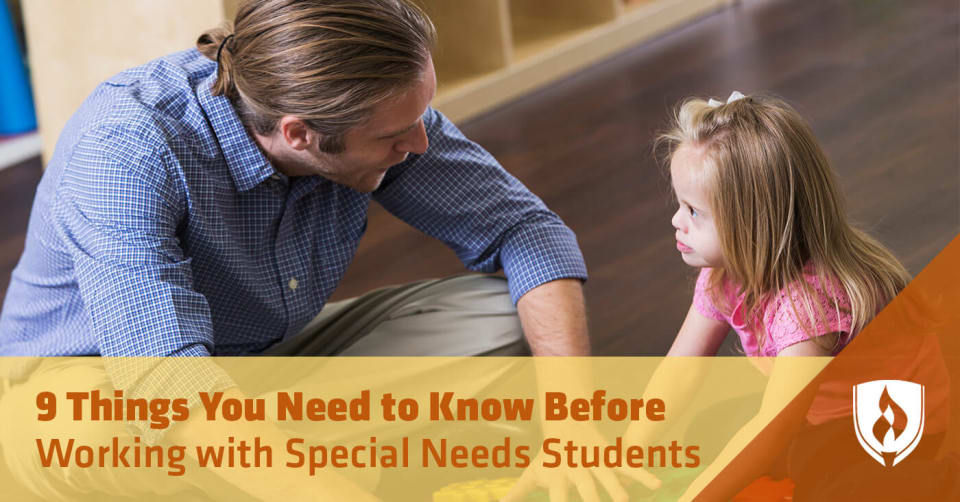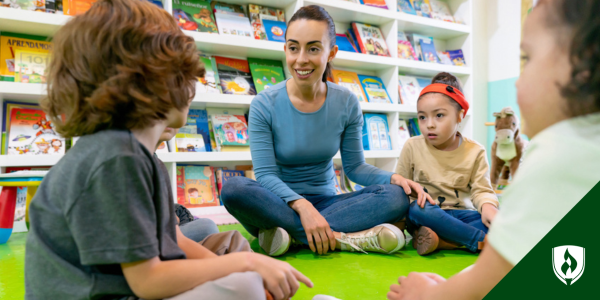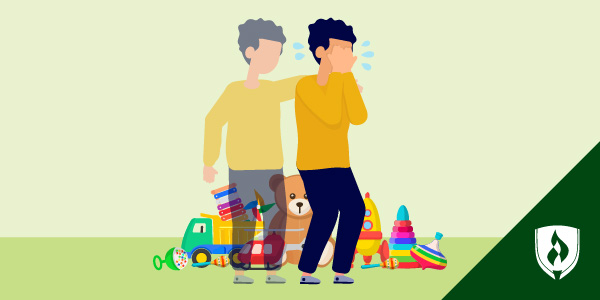9 Things You Need to Know Before Working with Special Needs Students
By Kirsten Slyter on 03/04/2019

Ask any teacher and they’ll tell you working with special education students can be challenging. There’s paperwork, varying workloads and, some would say, an under-appreciation from others for the difficult work they do.
We asked experts who are experienced in teaching students with special needs to provide a little insight into their daily duties so you have a better understanding of what it takes to succeed in this specialized branch of educational instruction.
What you should know about working with children with special needs
When considering any career path, it helps to have a behind-the-scenes look at the road ahead. Consider this expert insight your test drive to know if you have what it takes to work with special needs students.
1. It will be stressful
Stress is unavoidable in most teaching jobs but particularly so when teaching special education students—no matter how talented you are as an instructor. Students with special needs often require more attention than students without special needs to ensure they’re making progress, so teachers are susceptible to being spread too thin. Also looming large as a source of stress is the potential for a student “meltdown.”
Former special education teacher Jeaninne Escallier wishes an experienced teacher would have shown her the most effective ways to handle these situations before she faced one on her own. “Emotionally disturbed students sometimes lash out at the teacher and other students.”
Escallier says it’s important for special education teachers and administrators to make sure there’s enough coverage for each student in their class to help prevent dangerous situations. In addition to having enough help on hand, you need to be able to remain calm to keep things from getting out of control.
“Many autistic children express their desires by screaming,” Escallier says. “Adults must remain calm and always in control to make the children feel safe and loved.”
2. You’ll wear multiple hats
“A special education teacher is more than a classroom teacher,” Escallier says. “He or she is a community advocate and liaison for services that will make that child successful in life, not just in school.”
Your job title might read “special education teacher,” but there are plenty of unofficial duties that come with the job. Not only are you a teacher, but you’ll become an advocate, a coordinator and a counselor.
Educational therapist Erin Smilkstein says counseling and communicating with the parents of children with special needs is a huge part of the job. Parents, unlike special education teachers, have no specialized training and may lean on your expertise.
“I counsel parents a lot,” Smilkstein says. “I sit with them and guide them through the process of how to talk and work with their children—sometimes I say I am more of a parent support than a teacher.”
3. You'll need to communicate well
Teaching special needs children may be stressful, but at least you won’t be on your own. Generally, classes with special needs children have more than one adult in the room. Knowing how to collaborate with your colleagues on lesson plans, classroom projects and unexpected meltdowns can make all the difference for you and the students you teach.Effective communication is also important when speaking with parents. Often times, mothers and fathers of special needs children can feel overwhelmed. They’ll look to your expertise and guidance for clarity on their children’s progress. They may be frustrated, concerned or discouraged, but maintaining open, clear communication is a must in this line of work.
4. Paperwork isn’t optional
Grading assignments and tracking scores is something that goes hand in hand with teaching. When it comes to working as a special education teacher, it’s important to know that you will most likely have more paperwork than teachers of traditional students.
Individualized Education Plans (IEPs) for students with special needs mean you will likely spend a considerable amount of time filling out paperwork that measures student progress. Escallier says the most challenging part of her time as a special education teacher was finding a balance between her work and her private life, especially with the added “homework.”
“I worked late nights and all weekend on these [IEPs] because I still had to teach and maintain classroom control during teaching hours,” Escallier says.
While these individualized plans will require additional work, it’s important to remember their purpose. Special needs students can’t be expected to learn and progress at a uniform pace; these plans help set and track learning goals and objectives that are appropriate for each student’s needs.
5. Employment of special education professionals remains steady
Demand for teachers in general isn’t particularly volatile—barring large changes to government policy, employment opportunities should stay on a steady course. The BLS projects an eight percent growth in employment for K-12 special education teachers by 2026, which is just slightly above the seven percent national average projected growth in employment for all occupations.2
It’s worth noting that preschool special education teachers are an exception, with employment growth projected to increase 11 percent through 2026.2
6. There is no “typical” student
Part of the challenge of being a special education teacher is managing the wide variety of students and their capabilities. For instance, a child who is nonverbal needs an entirely different approach to education than a student with Attention-Deficit/Hyperactivity Disorder (ADHD). This requires teachers to be flexible in their teaching styles while keeping realistic the expectations they have for students.
Smilkstein says many people assume students in special education classes just have emotional or behavioral problems and write off their potential or ability to learn. The key for Smilkstein is to keep everything in perspective.
“[These] kids work as hard as they can, but they will also protect themselves from pain,” she says. “That can often look like they have behavioral problems or unwillingness to work when they fear another failure is going to happen.”
7. Having fun is crucial
“The emotional component of learning for a student with special needs is so important to address,” says Smilkstein. “You’ll find you accomplish more when you set out acknowledging that education needs to be a good experience for the child.”
In all likelihood, you’ve had to slog through a dull class or two in your lifetime. Boredom saps the energy out of a classroom and can be a real detriment to student learning. It’s important for teachers to embrace fun in their lessons—besides, how many jobs really encourage being a little goofy? Smilkstein says that even though people might think of her job as serious, intensive work, she plays and laughs with students multiple times a day.
8. It can be an uphill battle
Simply put, it takes skill and plenty of patience to explain a concept to a child—whether they have special needs or not! Both students and teachers will have to deal with the frustration of not grasping an elusive concept, but Smilkstein says it’s important to embrace the challenge.
“Something that is very helpful to keep in mind is that kids are trying to do their best,” says Smilkstein. “As much as you may find yourself creating labels like ‘He’s lazy’ or ‘She’s impossible,’ you need to continue to look at yourself as the key problem solver, with learning as the puzzle.”
9. It’s all worth it
“There is nothing more satisfying than watching a child learn something new and the way it changes their self-esteem and confidence,” Escallier says.
Don’t let the frustration and stress that comes with being a special education teacher fool you into thinking it’s all bad—there are plenty of rewarding moments as well. Smilkstein says the most rewarding part of her job are the moments when pupils make a breakthrough. These breakthrough moments are especially sweet for both teachers and students as they know firsthand the hard work and heartache that went into the achievement.
The reward of the job isn’t strictly coming from the satisfaction of your students, either. Parents of children with special needs have certainly had times of feeling overwhelmed and know how hard-earned progress can be. Because of that, you can expect to receive some truly heartfelt praise and gratitude.
“The most rewarding part of my time in special education was getting children into the right programs for their needs,” Escallier says. “So many parents have called me their savior because I never gave up on their child until they got the care they needed.”
The bottom line
Teaching special needs students is no picnic—stress and paperwork can make even the most cheerful people grumble a bit—but there are plenty of moments that make the job very rewarding. It’s important for would-be special education teachers to be fully committed to their work as this is not a career that lends itself to a halfhearted effort. Here’s the good news—if you have the right attitude and are willing to put in the work, you are well on your way to working in this demanding but gratifying career.
If working with children with special needs appeals to you, you’ll want to check out the Rasmussen College Early Childhood Education Associate’s degree program—which features a Special Needs specialization designed to equip you with the skills needed to effectively work with these students.
1Bureau of Labor Statistics, U.S. Department of Labor, Occupational Employment Statistics, Occupational Employment and Wages, May 2017, [information accessed January 29, 2019] https://www.bls.gov/oes/2017/may/oes252051.htm. Information represents national, averaged data for the occupations listed and includes workers at all levels of education and experience. Employment conditions in your area may vary.
2Bureau of Labor Statistics, U.S. Department of Labor, Occupational Outlook Handbook, [information accessed January 29, 2019] https://www.bls.gov/ooh/. Information represents national, averaged data for the occupations listed and includes workers at all levels of education and experience. Employment conditions in your area may vary.
*Graduates of Early Childhood Education programs at Rasmussen College are not eligible for licensure as a teacher in an elementary or secondary school. A Bachelor’s degree and a state teaching license are typically required to work as a teacher in public and private school settings.
EDITOR’S NOTE: This article was originally published in June 2015. It has since been updated. Insights from Escallier and Smilkstein remain from the original article.




